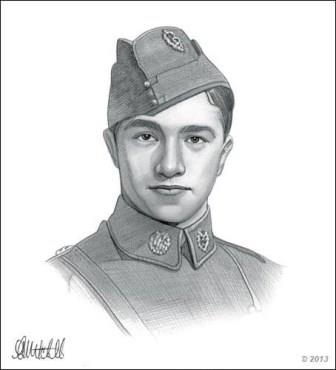Saturday 7 May 2016 saw Air Cadets from 1359 (BEESTON) Squadron join fellow Air Cadets from across the northern sector of the South and East Midlands Wing pay their respects to a true Nottingham hero, Captain Albert Ball VC.
Towards the end of a long hot day, ten squadron contingents from the Nottingham area mustered on the Nottingham Castle Green and were formed into two large flights by Beeston Warrant Officer(WO) Rob Phillips, ready for sizing by highly trained Air Cadet Organisation drill instructors. With the parade formed and perambulating officers “fell in” to position it was time for the ceremonial “falling in” of the Wing Banner to be carried out, expertly paraded into position between the two flights.
With picturesque Nottingham Castle providing the back drop, the parade commander, Flight Lieutenant(Flt Lt) Jodi Hudson headed the “diamond” poised to give the command to march off towards the waiting crowd and act of homage at the memorial to Captain Ball.
As the parade marched off it was with some pride that those within the diamond recalled they had all served at 1359 (BEESTON) Squadron. Flt Lt Hudson, Flt Lt Jack Stepanian, Flt Lt Phil Bannister and WO Dan Haywood have all served at Beeston, with Flt Lt Bannister the current Officer Commanding (OC).
Directed into place by WO Phillips around the touching statue to Captain Ball that forms his memorial the parade were able to take a quiet moment to think about the man they were gathered to remember. Albert Ball was born on 16/08/1896 in Lenton Nottingham, the son of a plumber. With the declaration of war in 1914 he joined the Sherwood Foresters Regiment and was soon selected for a commission as an officer. Deciding to  pay for his own flying training lessons he displayed a total disregard for the dangers of flying, but by the beginning of January 1916 Albert Ball transferred as a qualified pilot to the Royal Flying Corps and the legend was to born. By June 1916 he was awarded the Military Cross and by August he had shot down 10 German aircraft in the last two weeks of the month alone, bringing his total ‘kills’ to 17. By September 1916 he was awarded the British Distinguished Service Order and Bar and Russia awarded him the Order of St George. By the end of September his combat score was 31 enemy aircraft destroyed. In November 1916 Ball was award a THIRD bar to his DSO by King George V for attacking three German aircraft by himself, shooting down one and damaging the others. Ball was now a national hero and his reputation as a fearless combat pilot was legendary.
pay for his own flying training lessons he displayed a total disregard for the dangers of flying, but by the beginning of January 1916 Albert Ball transferred as a qualified pilot to the Royal Flying Corps and the legend was to born. By June 1916 he was awarded the Military Cross and by August he had shot down 10 German aircraft in the last two weeks of the month alone, bringing his total ‘kills’ to 17. By September 1916 he was awarded the British Distinguished Service Order and Bar and Russia awarded him the Order of St George. By the end of September his combat score was 31 enemy aircraft destroyed. In November 1916 Ball was award a THIRD bar to his DSO by King George V for attacking three German aircraft by himself, shooting down one and damaging the others. Ball was now a national hero and his reputation as a fearless combat pilot was legendary.
On 7 May 1917 Captain Ball took off for the last time in search of the enemy and was soon engaged in a ferocious dog fight. While in combat with German aircraft, Ball was seen diving into a dark thundercloud, emerging from the bottom of the cloud upside down and with the engine stopped, with a black cloud of smoke trailing behind. The aircraft crashed, and Ball was found in the cockpit, dead. He was 20 years old, the same age as many senior rank cadets serving in the ATC. To mark his bravery in their skies against the German invader, the French government posthumously awarded Ball the Legion d’Honneur and King George V awarded the Victoria Cross, the British Empire’s great bravery honour for his “most conspicuous and consistent bravery”.
The proud ex service standards were joined around the memorial by the massed blue standards of the 10 local squadrons, which were solemnly dipped during the minute silence, only broken by the massed bugles of the Robin Hood Rifles Army Cadet Force.
Smartly and proudly the parade marched past OC South and East Midlands, Wing Commander Nigel Dicinson, proud parents and veterans bearing witness to the grand spectacle as the perfectly in step flights returned to castle green for the final dismissal from the 99th anniversary of Nottingham’s true hero.
WO R PHILLIPS

